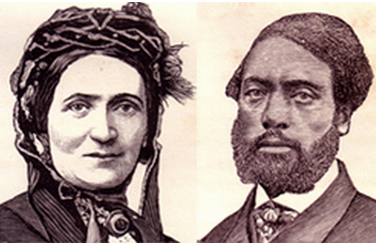
Abolitionists
The death-defying escape of Ellen and William Craft was well-known to abolitionists on both sides of the Atlantic during the 1850s.
We thought of plan after plan, but they all seemed crowded with insurmountable difficulties.
William (1824-1900) and Ellen Craft (1826-1891) were born into enslavement in Georgia. Once they were married, both William and Ellen knew that their union was not recognised by racist southern laws, and they were susceptible to be sold and separated at any time. They resolved to escape and ingeniously hatched a plan: Ellen could pass for white, so she performed as a white southern enslaver with William posing as her enslaved manservant. Both Ellen and William Craft risked torture, incarcertaion and death if captured.
 William and Ellen Craft (Wikipedia)
William and Ellen Craft (Wikipedia)
After taking several trains (with one hair-raising moment when Ellen recognised a man sitting opposite her as a friend of her enslaver) they managed to escape to Boston via the Underground Railroad. Legally, both William and Ellen were still fugitives, and were in great danger when the Fugitive Slave Act of 1850 was passed. Fugitive slave catchers were sent from the South to retrieve them, but William and fellow black activist Lewis Hayden met them at the door of Hayden’s house, threatening to blow them all up with dynamite if they crossed the threshold. For their safety, the Crafts sailed to England and lectured against American slavery.
For nineteen years, they lived in England, and they toured the country speaking about life in chattel slavery. They returned to the United States in 1868 and set up a farm in Georgia.
He hoped that it would not be supposed that they gloried in the deception they had been obliged to practice in order to make their escape from bondage, but when the meeting considered what a degraded condition they were in slavery, that they were mere things, chattels, liable to be sold like the beasts of the field and when they considered the happy prospect of freedom which was opened before them, he hoped that the people of England would acquit them and not charge the crime upon them, but upon the accursed system which had compelled them so to act in order to regain their God-given rights.